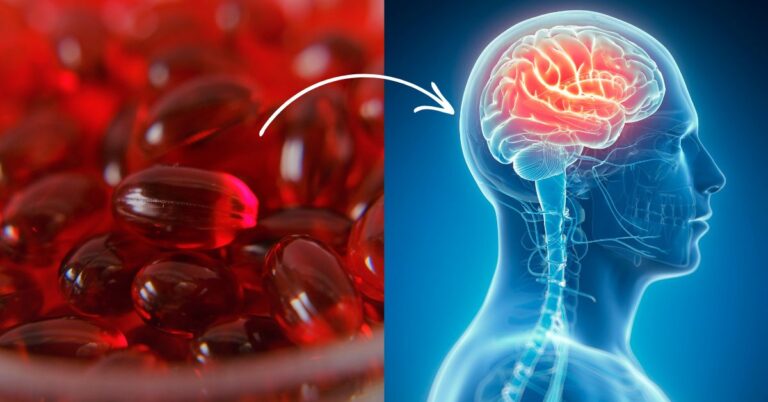When our body gets hurt or infected, it responds to inflammation, a normal part of the healing process. But, this inflammation can sometimes persist for a long time and become harmful, causing various health issues. This is particularly true for our brain, where long-term inflammation can lead to serious problems like Alzheimer’s, Parkinson’s, depression, and anxiety. Fortunately, there are strategies to reduce brain inflammation, and emerging research highlights the potential benefits of omega 3 from krill oil to boost brain health.
What Causes Brain Inflammation?
Brain inflammation, or neuroinflammation, can be triggered by various factors, including:
- Infections
- Traumatic brain injury
- Autoimmune diseases
- Exposure to toxins
- Chronic stress
- Neurodegenerative diseases such as Alzheimer’s and Parkinson’s
How To Diagnose Brain Inflammation?
Brain inflammation, or neuroinflammation, occurs when the brain’s immune cells become activated in response to a threat. While acute inflammation is beneficial, chronic inflammation can damage brain cells and disrupt brain function. Factors contributing to chronic brain inflammation include poor diet, lack of exercise, stress, exposure to toxins, and underlying health conditions.
Since there isn’t a single definitive test for diagnosing brain inflammation, healthcare professionals often rely on a combination of methods to assess the condition. These methods include clinical assessments, advanced neuroimaging techniques, and specific laboratory tests tailored to the individual’s symptoms and the suspected underlying cause of the inflammation.
Strategies To Reduce Brain Inflammation
Reducing brain inflammation involves adopting a holistic approach encompassing diet, lifestyle, and supplementation. Here are effective strategies to consider:
Adopt An Anti-inflammatory Diet
Focus on healthy food rich in whole foods, fruits, vegetables, lean proteins, krill recipes, and healthy fats like garlic butter krill. Diets high in omega-3 fatty acids are particularly beneficial due to their anti-inflammatory properties. Avoid processed foods, sugars, and trans fats, which can exacerbate inflammation.
Regular Exercise
Staying physically active is great for your body and mind. Research shows it can help reduce swelling in the body, even in the brain. You don’t have to go too hard; aim for 30 minutes of exercise that gets you a bit sweaty most days of the week. It’s a great way to stay healthy and feel good!
Manage Stress
When we experience chronic stress, our body tends to produce high levels of cortisol – a hormone that can cause inflammation if it remains elevated for an extended period. We can try meditation, yoga, deep breathing, and mindfulness to manage stress.
Ensure Adequate Sleep
Quality sleep is crucial for brain health. Poor sleep patterns can increase inflammation, so aim for 7-9 hours of good-quality sleep each night.
Limit Alcohol and Quit Smoking
Both excessive alcohol consumption and smoking have been linked to increased inflammation. Low alcohol intake and quitting smoking can significantly lower inflammation levels.
Consider Supplements
Certain supplements, including turmeric (curcumin), green tea extract, and omega-3 fatty acids, have potent anti-inflammatory effects.
The Role of Krill Oil in Reducing Brain Inflammation
Krill oil, derived from small crustaceans called krill or often called “Antarctic krill,” is gaining attention for its potential to reduce brain inflammation. Here’s why krill oil could be particularly beneficial:
- High in Omega-3s: Krill oil contains EPA and DHA, two omega-3 fatty acids that help fight inflammation. If you are considering fish oil vs krill oil, let me tell you, unlike fish oil, the omega-3s in krill oil are primarily in phospholipid form, which may be more easily utilized by the body, including the brain.
- Contains Astaxanthin: Krill oil is a natural source of astaxanthin, a powerful antioxidant. Astaxanthin is known to benefit the brain by reducing inflammation and oxidative stress. It is particularly helpful because it can cross the blood-brain barrier, which makes it easier for the body to absorb and use.
- Choline Content: Krill oil is a good source of choline, a nutrient vital to brain health and inflammation. Choline is a substance that helps the brain make acetylcholine, which is important for learning and memory. It can also reduce inflammation.
Laboratory Tests for Inflammation
In functional medicine, especially within telehealth practices, initial steps often involve laboratory tests to identify markers of chronic inflammation within the body.
- C-Reactive Protein (CRP) and IL-6 Tests: These tests measure levels of CRP and IL-6, two proteins associated with inflammation. High levels can indicate chronic inflammatory conditions.
- Homocysteine Levels: When a substance called homocysteine is found in the blood in large amounts, it can damage the blood-brain barrier. The blood-brain barrier is important because it keeps harmful things away from the brain.
Assessing the Blood-Brain Barrier
Specific tests can be conducted to assess the integrity of the blood-brain barrier.
- Blood-Brain Barrier Protein Tests: These tests measure antibodies against occludin and zonulin, proteins that regulate the permeability of the gut and brain barriers. The presence of antibodies suggests damage to the blood-brain barrier.
Immune System Evaluation
- White Blood Cell Count: This test is part of the immune lab’s suite and helps identify underlying low-grade infections that may contribute to inflammation.
Neuroimaging Techniques
For cases where a traumatic brain injury or other structural issues are suspected, healthcare providers may refer patients for neuroimaging:
- MRI Scans: MRIs are highly effective in detecting structural changes in the brain, such as swelling or lesions indicative of inflammation.
- CT Scans: While less sensitive than MRIs for subtle changes, CT scans are valuable for assessing acute brain injuries and bleeding in emergencies.
Incorporating Krill Oil into Your Routine
Choosing a high-quality krill oil product from a reputable source is important when considering krill oil supplements. Look for supplements that specify the amount of EPA, DHA, and astaxanthin. The recommended dosage of krill oil can vary, so it’s advisable to follow the manufacturer’s recommendations or consult a healthcare professional.
Conclusion
Reducing brain inflammation is crucial for maintaining optimal brain health and function. You can significantly reduce inflammation levels by adopting a holistic approach that includes an anti-inflammatory diet, regular exercise, stress management, and adequate sleep. Additionally, krill oil is a promising supplement for combating brain inflammation, thanks to its unique omega-3 fatty acids, astaxanthin, and choline composition. As research continues to uncover the benefits of krill oil, incorporating it into your wellness routine could provide an extra layer of protection against chronic brain inflammation, supporting overall brain health and cognitive function.
Frequently Asked Questions
Can Exercise Reduce Brain Inflammation?
Absolutely. Regular physical activity, especially aerobic exercises like walking, swimming, and cycling, can promote the release of anti-inflammatory substances, potentially reducing brain inflammation.
Does Sleep Affect Brain Inflammation?
Indeed, it does. Quality sleep plays a crucial role in brain health. Lack of sleep or poor sleep quality can exacerbate inflammation, while adequate restorative sleep can help control inflammatory responses in the brain.












